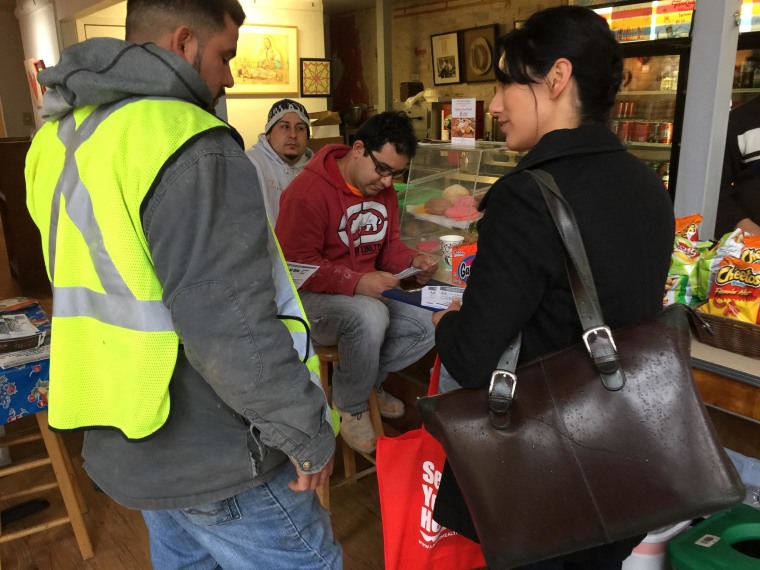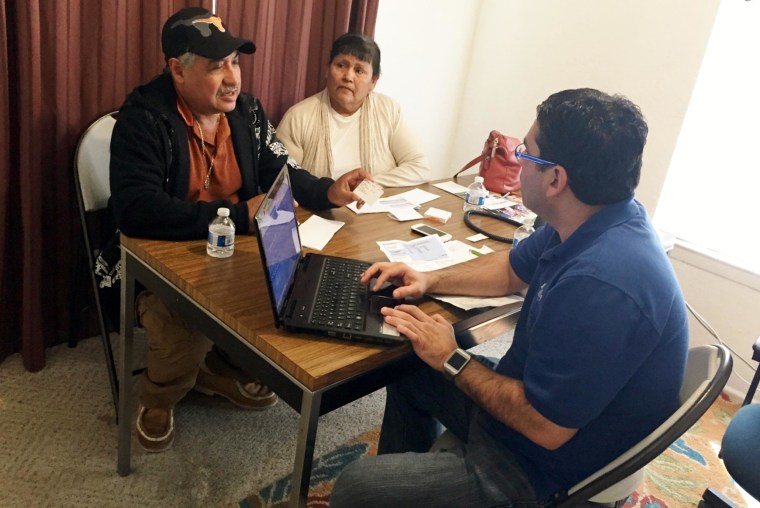
Alice Castillo, 61, and her common-law husband Crescencio Herrera, 54, of nearby Bastrop had come to get her enrolled. Though Herrera is covered through his work at a mattress company, Castillo said she was not, a situation which caused her constant worry. “This is a great opportunity,” she told NBC. “We’re all looking for something we can afford. Thank God I’m in good health now, but what if later on something happens.”
Though large numbers of Latinos signed up for health care during the first round of the ACA last year - shrinking the ranks of the uninsured before the law by about 7 percentage points - 1 in 4 Latinos in the U.S. still do not have health insurance, according to census data. Latino immigrants fare worse. They are more than twice as likely to be uninsured as native-born Hispanics, according to the Pew Research Center.
Latinos comprise about half of Travis County’s estimated 210,000 people without health insurance. About half of the Latino uninsured in the county qualify for the federal insurance marketplace, Rodriguez told NBC News.
“The issue for Latinos is we’re disenfranchised. We have legal status issues in some households, financial constraints, language issues,” Rodriguez said.
Many enrollment organizations are not culturally competent and don’t know how to approach cultural and economic diversity in the Latino population, he said.
“There’s multiple touch points. It’s verbal, it’s face to face, being out in the field, being where they work, where they play and they pray. You got to have boots on the ground to achieve that,” Rodriguez continued. “Just about everybody that comes through our door speaks Spanish. That’s all they speak. They’re not going to be the ones prone to get on their computer and enroll. A lot of them don’t have Internet accounts.”

According to the Kaiser Commission on Medicaid and the Uninsured, the great majority of all uninsured are low-income working families. In 2013, nearly 8 in 10 were in a family with a worker, and nearly 6 in 10 have family income below 200 percent of the federal poverty line.
Unlike other states, Texas did not expand Medicaid coverage to low-income adults - one of the major provisions of the ACA - which leaves some Texans in a "coverage gap" between those whose incomes are above Medicaid eligibility limits but below the lower limit for health insurance marketplace premium tax credits. About a quarter of Americans in that coverage gap live in Texas.
In 2013, before the ACA went into effect, Latinos were much less likely than the general population to have jobs that offered insurance or paid enough for them to afford private insurance, according to Kaiser.
Among Latinos who are eligible, a factor that could be hindering Latino enrollment is the mixed legal status of some families. Many Latinos have family members who are not here legally and therefore not eligible for coverage.
Though they think fears have quieted, enrollment groups suspect some families might still worry about repercussions if their undocumented status is exposed.
“We’re not going to turn them in if they are here undocumented,” Alvarado said. “We’re doing this for their families and their health.”
She summed up the reluctance of some Latinos to enroll in the health insurance marketplace. “They assume it’s not for them,” Alvarado said. They don’t find a connection, so they say, ‘That’s not for us.’”
“We want to make it for them.”